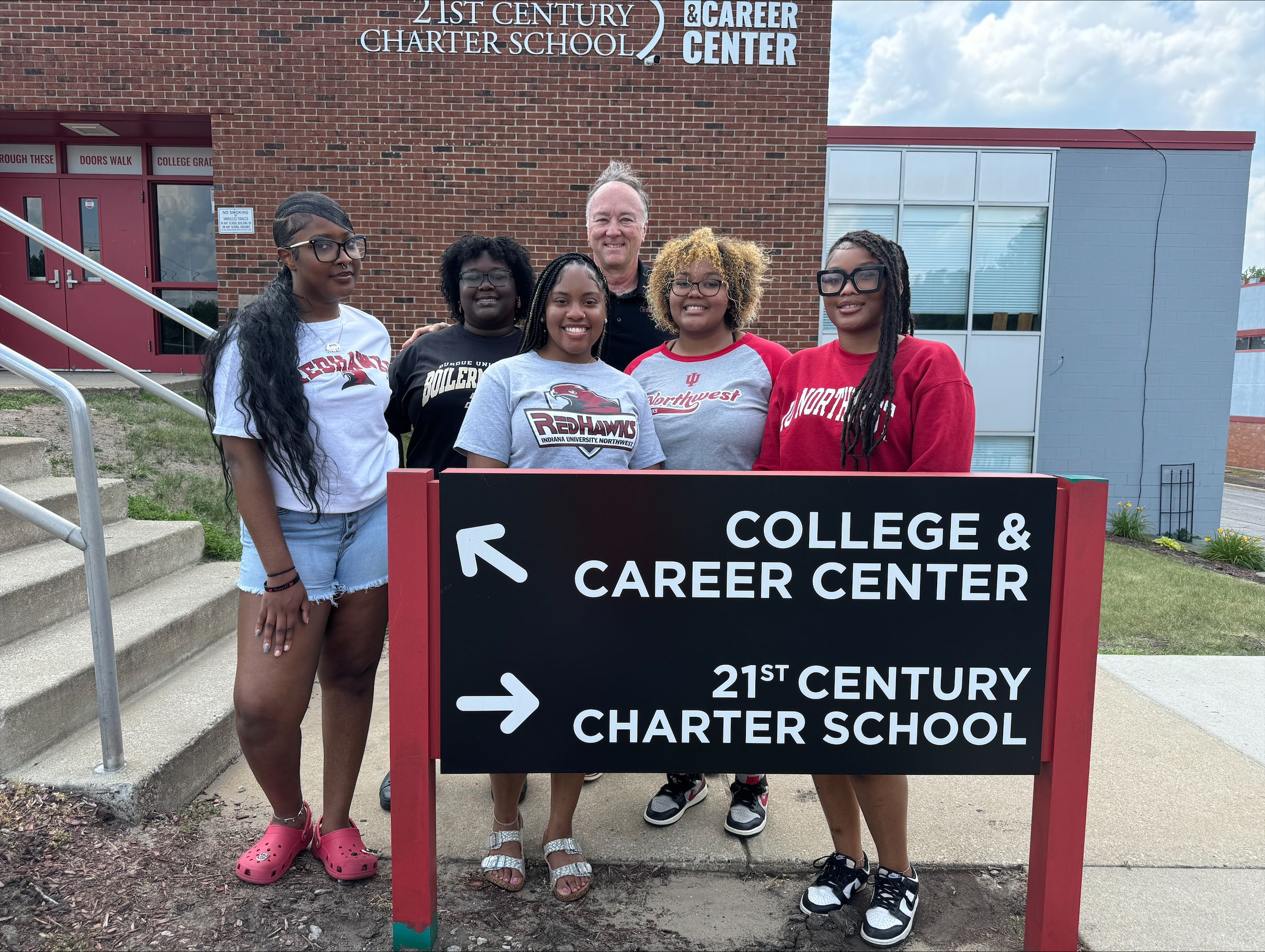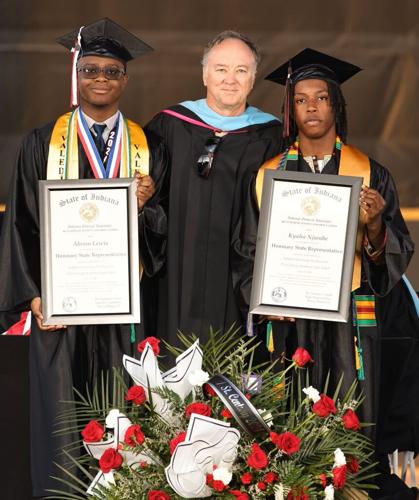Forging the future: 21st Century Charter School rebuilds Gary, Indiana’s legacy through education

In the early 2000s, the storied city of Gary, Indiana, was ready for a renaissance. The once-booming steel town, responsible for building many of America’s skyscrapers, now wanted to forge something even greater: new academic and economic opportunities for the next generation.
Leadership in Gary recognized that the key to the city’s transformation lay in its youth. To assist them in reaching their goals, they connected with leaders including Kevin Teasley, founder and CEO of the Indianapolis-based GEO Foundation. Teasley envisioned introducing a new school uniquely designed for a place once known as “The Magic City.” One that empowered every student to graduate high school, pursue a college degree, and launch an in-demand career. A place that would give students the tools to improve their futures, and in turn, spark a new era of prosperity for their families and the community.
In 2005, the GEO Foundation’s 21st Century Charter School opened its doors to 264 students. Today, nearly 1,200 attend, with more graduating each year armed with a high school diploma and a head start on college and careers.
But for a growing number of 21st Century students, they are earning their postsecondary degree before walking across the stage at their high school graduation. It is a reimagining of the traditional education model and a testament to a city still making magic happen—this time through its students.
“The biggest challenge we had was the mentality that these kids can’t go to college.”
-Kevin teasley, founder and ceo of the geo foundation
Early Struggles, Early Solutions, Early College
A pivotal moment in 2011 played a major role in shaping the 21st Century Charter School students know today. Vincent Pena, a 16-year-old student, was on the verge of dropping out.
“No one in my family went to college. We can’t afford it and my family needs me to help pay the bills,” he told Teasley.
It was a response school leaders heard too often. Teasley, knowing Pena was capable of college-level work, treated the impending dropout as a “five-alarm fire.” He directed staff to take Pena to the local Ivy Tech Community College campus to complete the ACCUPLACER. Once he passed, staff helped enroll him in college classes, with the school funding tuition and textbooks. Administrators rearranged Pena’s high school schedule to accommodate his postsecondary coursework and ensured he had the support to succeed.
Two years later, Pena enjoyed his high school graduation having already earned an associate degree—a first for Northwest Indiana. Pena’s trailblazing achievement served as a watershed moment for students and the school.

Every 21st Century student applauding his accomplishments that day suddenly saw college as a possibility for themselves.
“The biggest challenge we had was the mentality that these kids can’t go to college,” Teasley said.
With new aspirations unlocked, the school accelerated its adoption of the Early College High School model from the Center of Excellence in Leadership of Learning (CELL) to ensure all students had the same opportunity to earn college credits, the Indiana College Core, or an associate degree while in high school. The school focused on creating a college-going culture, developing academic and social supports, and building clear postsecondary pathways as defined by the Early College framework.
The next year, three more students graduated high school with an associate degree. The year after, it was six. In 2017, 21st Century Charter School celebrated Raven Osborne, who earned a bachelor’s degree from Purdue University Northwest before earning her high school diploma. It wasn’t just a first for the school, but for the state.
The school made history again in 2024 with 15-year-old Khaya Njumbe, now the state’s youngest to earn a bachelor’s degree, after he earned a bachelor’s in neuroscience from Indiana University Northwest. Five more students, which Teasley calls “The Fab Five,” are positioned in 2025 to join Raven, Khaya, and others who graduated high school with an associate or bachelor’s degree in hand.
“We want them to experience the college atmosphere, learn time management and self-discipline, develop perseverance, work with different people, and get the grade to earn the credit.”
-Kevin teasley, founder and ceo of the geo foundation
Creating a College-Going Culture
21st Century’s approach focuses on eliminating barriers—both perceived and real—that keep students from higher education. From the moment students enter ninth grade, they are assessed for college readiness. Those prepared begin taking college courses immediately. For students not quite there yet, the school provides academic remediation. The goal is simple: get students onto a college campus, taking real college courses, as soon as possible.
“We don’t have limits,” Teasley said. “We want them to experience the college atmosphere, learn time management and self-discipline, develop perseverance, work with different people, and get the grade to earn the credit.”
Every member of the staff emphasizes the importance of college. The school hosts financial aid talks. Students participate in FAFSA nights and receive assistance with postsecondary applications. College visits happen regularly. And everyone—from the janitorial staff to the main office—commemorates every degree earned with a Super Bowl-like schoolwide celebration.
“Our mantra is ‘Enroll for kindergarten, stay for college.’ There is power for students in seeing one of their own make this a reality. They recognize they can do it too,” Teasley said.
The model is working. Today, 100% of 21st Century seniors earn college credits, along with 50% of juniors and 25% of sophomores. Even 10-15% of first-year students achieve college credit. The school’s success is not limited to traditional postsecondary pathways either. Students can pursue career certifications in fields like welding, nursing, and culinary arts. Four students have earned a pilot license. The school helps align student interests with educational opportunities.
“It’s about finding all the resources to support these students in the community. That allows us to spend our dollars providing individualized instruction that results in more kids going to college.”
-Kevin teasley, founder and ceo of the geo foundation
A Personalized Pathway for Every Student
What makes 21st Century’s approach so effective is its commitment to individualized pathways. The school does not base its system on traditional education models or the “average” student. Instead, it empowers each student with a personalized plan—whether that means pursuing an associate degree, bachelor’s degree, or a career certification.
“We apply an individualized mindset to every student,” Teasley emphasized. “Our high school/college counselor is the most important person in the building because they know where every student is academically and help design their pathway accordingly.”
26.7% of grade 12 students earn a high-quality college or career credential
The results speak for themselves. The current graduation rate for 21st Century Charter School is 93.4%. The percentage of grade 12 students earning high-quality college and career credentials is 26.7% far surpassing Indiana’s average of 5.5%. More than 75% of students who graduate with an associate degree earn their bachelor’s within three years, far outpacing the national average for community college students.
The money matters too. 21st Century Charter School covers all college tuition and book fees for its high schoolers—a cost of nearly $600,000 annually.
“There is this misperception that all you can get with K-12 dollars is a K-12 education,” said Teasley. “How do we afford $600,000? We build with the end in mind. We don’t spend a lot of money to create what already exists. It’s about finding all the resources to support these students in the community. That allows us to spend our dollars providing individualized instruction that results in more kids going to college.”
“We’re not a destination. We’re a launching pad. When you come to 21C, we ask, ‘Where do you want to go?’ Our job is to help you get there.”
-Kevin teasley, founder and ceo of the geo foundation
Transforming a Community
The impact of 21st Century Charter School goes beyond student success. By providing opportunities that once seemed out of reach, the school is helping stabilize the community, retain talent, and boost Gary’s economy.
The ripple effect is even affecting families, about 90% of which never went to college.
A bus driver for the school enrolled in college alongside her daughter. In 2015, both graduated with associate degrees. Today, that same family proudly boasts multiple bachelor’s and master’s degree holders, with one member now pursuing a doctoral degree.
“Many of the students we serve come from single parents, incarcerated parents, immigrant parents. Most are first-generation college-goers. If these students can do it, anyone can do it. More high schools need to help them try,” Teasley said.
Breaking the Status Quo
For decades, the traditional education model has followed a linear path—graduate from high school, then go to college. 21st Century Charter School is breaking that mold with Early College. By blending high school and college experiences, the school proves that students can handle more than the system traditionally expects of them.
As schools across Indiana search for ways to improve student outcomes, 21st Century Charter School exemplifies what is possible. With its commitment to empowering students, creating individualized pathways, and removing college access barriers, the school is transforming lives—a renaissance fitting for The Magic City of Gary, Indiana.
“We’re not a destination,” Teasley said. “We’re a launching pad. When you come to 21C, we ask, ‘Where do you want to go?’ Our job is to help you get there.”
—
The Center of Excellence in Leadership of Learning (CELL) at the University of Indianapolis supports schools as they implement an Early College High School model and pursue endorsement.
